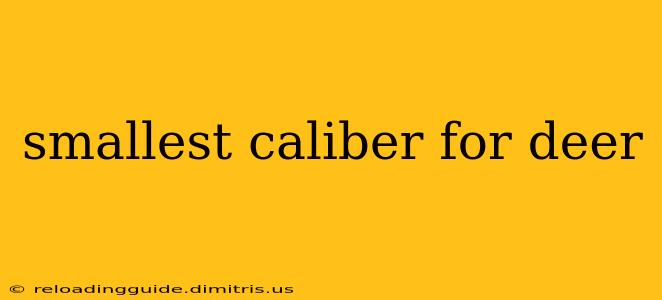Choosing the right caliber for deer hunting is crucial for a clean, ethical kill. While many calibers are effective, the question of the smallest suitable caliber often sparks debate among hunters. There's no single definitive answer, as effectiveness depends on several factors including shot placement, bullet selection, and the deer's size and distance. However, we can explore the considerations and some commonly discussed calibers.
Understanding the Ethical Considerations
Ethical hunting prioritizes a quick and humane kill. Using a caliber too small risks wounding the animal, causing unnecessary suffering. Factors influencing the ethical choice include:
-
Bullet Energy and Penetration: The bullet must have enough energy to penetrate vital organs and cause sufficient damage for a quick kill. Smaller calibers, while capable, require incredibly precise shot placement.
-
Shot Placement: This is paramount regardless of caliber. A well-placed shot with a smaller caliber can be more effective than a poorly placed shot with a larger one. Accurate shot placement demands practice and skill.
-
Deer Size and Distance: Larger deer require more stopping power. The distance to the target also affects energy transfer; the bullet loses energy over distance, reducing its effectiveness.
Calibers Often Discussed for Deer Hunting
Several calibers are frequently mentioned in discussions about the smallest suitable options for deer. It's crucial to remember that these are just starting points, and individual experiences and preferences vary widely.
.223 Remington/.22-3 (5.56x45mm):
This caliber is often debated. While some experienced hunters use it successfully on smaller deer at close range, it is generally considered marginal for larger deer or longer shots due to its limited energy and penetration capabilities. Success heavily relies on perfect shot placement.
.243 Winchester:
This is a popular choice among many hunters for deer, offering a good balance of energy, accuracy, and recoil. It provides more stopping power than the .223 Remington, making it a more reliable option for a wider range of deer sizes and distances.
6.5 Creedmoor:
A relatively newer cartridge quickly gaining popularity, the 6.5 Creedmoor boasts excellent accuracy and flat trajectory, making it suitable for longer ranges. Its higher energy levels compared to the .243 make it a capable choice for deer of various sizes.
Beyond Caliber: Other Crucial Factors
Choosing a caliber is only part of the equation. Other critical factors influencing a successful hunt include:
-
Bullet Construction: Choosing the right bullet type (e.g., expanding, bonded) is vital for ensuring adequate energy transfer and penetration. Different bullet types perform better in various situations.
-
Rifle Accuracy: A precise rifle capable of consistent shot grouping is essential. Inaccurate rifles will negate any advantages of a powerful caliber.
-
Hunter Skill and Practice: Proficiency in shot placement and understanding of ballistic principles are paramount for ethical and successful hunting. Regular practice is crucial.
Conclusion
There's no universally agreed-upon "smallest" caliber for deer hunting. The ethical use of any caliber depends on multiple factors, primarily shot placement, bullet selection, and the hunter's skill. While smaller calibers can be used, hunters should prioritize calibers that provide sufficient energy and penetration to ensure a quick, humane kill. The .243 Winchester and 6.5 Creedmoor are generally considered reliable options that offer a good balance of effectiveness and manageable recoil. Always prioritize ethical hunting practices and responsible firearm use. Consult experienced hunters and research extensively before making your decision.

